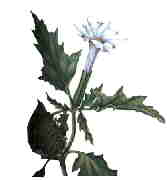
Known as: Angel's Trumpet, Datura, Desert Thornapple, Devil's
Trumpet, Downy Thornapple, Jimsonweed
Latin Name: Datura stramonium (Solanaceae family
- Nightshade)
Description: A large annual herb with conspicuous white-to-purple
tubular flowers up to 10 cm (4 in) long and large, round, spiny fruits.
The alkaloids, produced in the leaves, seeds, and other parts of the plant,
are poisonous. Grows up to 5 feet tall with a pale geen stem and spreading
branches. Leaves are ovate with green or purplish coloration, coarsely
serrated along the edges, and anywhere from 3 to 8 inches long. Flowers
are white or purple with a 5-pointed corolla up to four inches long and
are set on short stalks in the axils of branches. Seeds are contained in
a hard, spiny capsule, about 2 inches in diameter, which split lenghtwise
into four parts when ripe.
Poisonous parts: All parts (extremely poisonous), including
the nectar. Seeds are the greatest risk as the alkaloid contents are higher
than in the leaves and stems.. Contains many toxic components, in particular
the alkaloids, including atropine, hyoscyamine, and hyoscine (scopolamine).
Symptoms: Causes vomiting, abdominal pain, cramps, diarrhea,
intense thirst, rapid pulse, convulsions, coma, death. Can
be fatal. Once the plant is consumed, signs become apparent within
a few minutes up to several hours. The alkaloids in Jimsonweed act on the
central nervous system as well as the autonomic nervous system that controls
bodily functions. Animals may seek water to drink, have dilated pupils,
become agitated, may exhibit increased heart rate, tremble, become delirious,
may appear to be experiencing hallucinations, have convulsions (which may
be violent), become comatose, and possibly die. Consumption
of Jimsonweed during gestation may result in abortions or birth defects.
Treatment: Unless your cat is unconscious or having convulsions,
induce vomiting and follow procedures to delay
absorption and speed elimination. Get prompt veterinary assistance.
